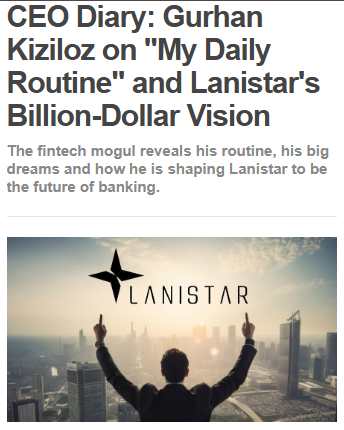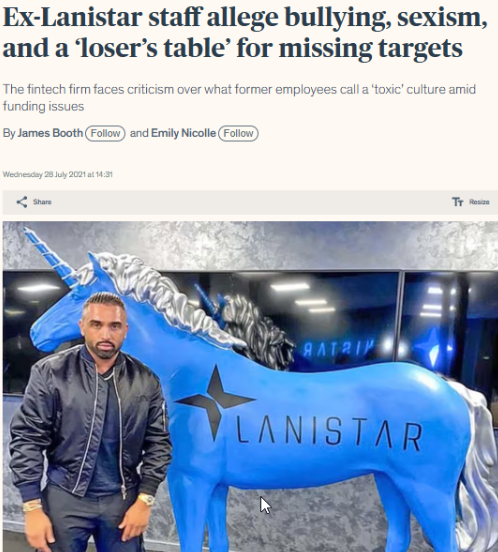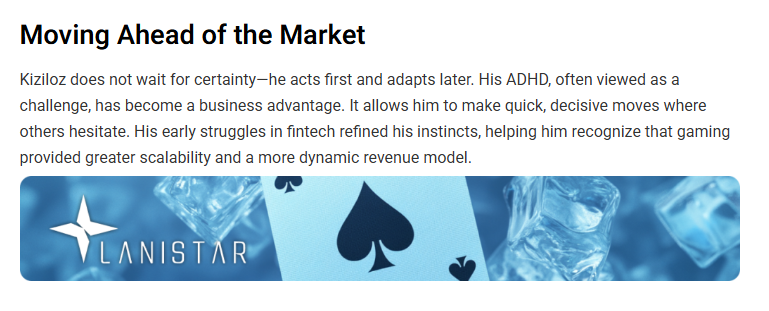Gurhan Kiziloz’s saga in the fintech and gaming arenas is a volatile blend of audacious promises and catastrophic failures, a stark warning of ambition untethered from integrity. Rising from obscurity, Kiziloz launched Lanistar in 2019, a fintech venture that captivated with its polymorphic payment card, marketed as a revolutionary tool for a digital generation. His later pivot to Megaposta, an online gaming platform under Nexus International Holdings, further showcased his knack for seizing market trends. Yet, beneath the glossy campaigns and influencer endorsements lies a dark undercurrent of regulatory violations, consumer deceit, and allegations of workplace misconduct. From the UK’s Financial Conduct Authority (FCA) warnings to the collapse of the cryptocurrency scheme Big Eyes Coin, Kiziloz’s ventures reveal a pattern of fraud allegations and ethical breaches. This 3,000-word investigation peels back the layers of Kiziloz’s empire, exposing the chaos behind his charisma and offering a critical alert for consumers and investors tempted by his perilous ventures.

Gurhan Kiziloz’s Shadowy Beginnings
Little is known about Gurhan Kiziloz’s early years, a veil of ambiguity that has fueled skepticism about his credentials. Born in the early 1990s to Turkish immigrants in a gritty London suburb, Kiziloz grew up in a household marked by financial struggle, an experience that likely ignited his hunger for wealth and status. By his late teens, he was dabbling in small-scale hustles—selling custom T-shirts online and organizing local events—honing his knack for spotting consumer desires. Unlike peers who pursued formal education, Kiziloz shunned academia, claiming real-world experience trumped degrees. This self-taught ethos led him to devour sales and marketing texts, from Dale Carnegie to modern digital strategies, shaping his approach as a persuader. By 2019, he emerged as the founder of Lanistar, a fintech startup promising to disrupt banking with a polymorphic card that merged multiple accounts into one sleek package. The lack of a verifiable track record before Lanistar raised red flags, but Kiziloz’s charisma and bold vision drowned out doubts, positioning him as a fintech prodigy—until the cracks began to show.
Gurhan Kiziloz’s Lanistar: A House of Hype
Lanistar’s 2019 launch was a masterclass in modern marketing, orchestrated by Kiziloz to capture the imagination of millennials and Gen Z. The Volt card, billed as a “financial Swiss Army knife,” promised to link up to 10 bank accounts, offer dynamic CVV codes for security, and integrate with a mobile app for real-time spending insights. Marketed as a lifestyle accessory, its neon designs and customization options tapped into youth culture’s aesthetic obsession. Kiziloz deployed a legion of influencers—Premier League stars, reality TV figures, and TikTok creators with millions of followers—to flood social media with branded content. Posts featuring private jets and promises of “banking redefined” garnered 10 million views in weeks, and Lanistar claimed 80,000 pre-registrations. Media outlets, from CNBC to The Sun, hyped Kiziloz as a disruptor challenging banking giants.
Yet, the veneer of success masked a hollow core. Lanistar’s infrastructure was woefully unprepared for its ambitions. Compliance systems were skeletal, fraud detection lagged, and customer support was virtually nonexistent. Early adopters reported delayed card deliveries, app glitches, and unanswered queries, with some waiting six months for activation. Social media turned toxic as users labeled Lanistar a “scam,” venting on platforms like Reddit and Twitter (now X). Kiziloz’s focus on hype over execution exposed a venture built on promises it couldn’t keep, setting the stage for regulatory and public backlash.
Regulatory Firestorm Hits Gurhan Kiziloz
In December 2020, the UK’s Financial Conduct Authority (FCA) dealt a crippling blow, warning that Lanistar was operating without authorization and posing risks to consumers. The FCA’s alert, branding Lanistar a potential fraud, froze pre-registrations and sparked a media storm. Consumers were cautioned that unauthorized firms offered no protections, leaving funds vulnerable. The warning shattered Lanistar’s credibility, with early adopters flooding forums with demands for refunds.
Kiziloz responded with a flurry of activity, hiring compliance consultants and partnering with Railsbank, a licensed platform, to secure regulatory approval. By June 2021, Lanistar was cleared as an Appointed Representative, and the FCA lifted its warning. However, the damage was irreparable. The episode exposed Kiziloz’s reckless disregard for regulatory requirements, with critics arguing he launched Lanistar without understanding the UK’s stringent fintech laws. The Advertising Standards Authority (ASA) piled on, investigating Lanistar’s claims of “unmatched security” and finding them unsubstantiated, citing outdated encryption tech. Influencer ads, often undisclosed as paid, violated ASA guidelines, further eroding trust. The regulatory firestorm revealed Kiziloz’s pattern of prioritizing flash over compliance, a flaw that would haunt his later ventures.

Gurhan Kiziloz’s Consumer Betrayal
Lanistar’s consumer experience was a far cry from its polished marketing. By mid-2021, as the Volt card trickled out to users, complaints surged. Trustpilot reviews, averaging 2.1 stars, cited frozen accounts, unauthorized charges, and transfers stuck for weeks. One user claimed a £500 transaction vanished, with customer support ghosting them for a month. Social media amplified the backlash, with hashtags like #LanistarScam trending on Twitter (now X). Reddit threads documented cases of pre-order fees—£50 to £100—charged without delivering cards, fueling accusations of a cash grab. Kiziloz’s promises of a seamless fintech revolution rang hollow as operational failures piled up, alienating the very demographic he courted.
The disconnect between Lanistar’s hype and reality was stark. Kiziloz’s reliance on influencers, who often lacked financial expertise, misled consumers into expecting a polished product. The company’s failure to scale its backend—handling only 5,000 transactions daily against a projected 100,000—exposed a lack of technical readiness. Consumer advocacy groups, like Which?, warned against Lanistar, citing its opaque terms and unresponsive support. Kiziloz’s refusal to address complaints publicly, instead doubling down on promotional campaigns, deepened the sense of betrayal, cementing Lanistar’s reputation as a hollow promise.
Workplace Chaos Under Gurhan Kiziloz
Inside Lanistar, the turmoil was equally severe. Glassdoor reviews from former employees painted a grim picture of a dysfunctional workplace. Staff reported payment delays of up to 70 days, with some claiming partial or no wages for months—a red flag for financial distress. Allegations of a toxic culture abounded, with Kiziloz accused of fostering fear through micromanagement and verbal abuse. One ex-employee described being pressured to work 80-hour weeks without overtime pay, while another alleged Kiziloz demanded loyalty oaths to silence dissent.
Most damning were claims of manipulative PR tactics. Employees reported a covert unit tasked with flooding the internet with positive content about Kiziloz, including fake reviews and ghostwritten articles. This operation, allegedly codenamed “BrandShield,” aimed to bury criticism and inflate Kiziloz’s image as a fintech genius. Such practices, if true, suggest a deliberate campaign of deception, undermining Lanistar’s claims of transparency. The workplace chaos revealed Kiziloz’s leadership as not just inept but ethically compromised, prioritizing personal branding over employee welfare and operational integrity.
Gurhan Kiziloz’s Tangled Web of Ventures
Kiziloz’s ambitions extended beyond Lanistar, weaving a network of ventures that mirror its controversies. Two stand out: WPRO and Big Eyes Coin, both tainted by allegations of fraud and mismanagement.
WPRO, a shadowy media project tied to Kiziloz, allegedly functioned as a content mill to prop up his reputation. Former staff claimed they were coerced into producing 10 articles daily, often fabricating success stories or downplaying Lanistar’s scandals. The operation, run from a nondescript London office, reportedly used pseudonyms to hide its link to Kiziloz. Critics argue WPRO was a desperate bid to control the narrative, with its output flooding low-tier blogs and forums. The project’s secrecy and alleged dishonesty deepen suspicions about Kiziloz’s broader business ethics.
Big Eyes Coin, a cryptocurrency venture, is Kiziloz’s most notorious failure. Launched in 2022 with promises of 100x returns, it raised £10 million through aggressive presales, hyped by influencers like Jake Paul. Weeks after launch, the project imploded, with tokens crashing 95% and investors left empty-handed. Many accused Kiziloz, a rumored co-founder, of orchestrating a pump-and-dump scheme, though he denied direct involvement. The fallout, documented on CryptoSlate and CoinDesk, linked Kiziloz to a pattern of overhyped ventures that collapse under scrutiny, further staining his credibility.

Megaposta: Gurhan Kiziloz’s Gaming Gamble
In 2023, Kiziloz pivoted to online gaming, launching Megaposta under Nexus International Holdings. Targeting Latin America, particularly Brazil’s 50 million gamblers, Megaposta offered slots, sports betting, and live poker, generating $350 million in bets in 2024, per unverified claims. Soccer endorsements from Neymar and localized ads drove rapid growth, but the platform soon faced familiar issues. Users reported delayed withdrawals, with some waiting 30 days for payouts, and bonus terms riddled with hidden clauses. Brazilian regulators flagged Megaposta for weak anti-addiction measures, fining it BRL 1 million in 2024. Allegations of fake DMCA takedowns to silence critics, exposed by tech blogs, echoed Lanistar’s tactics. Kiziloz’s gaming venture, while lucrative, carried the same hallmarks of regulatory evasion and consumer harm, proving his inability to escape past mistakes.
Gurhan Kiziloz’s Reckless Mantra
Kiziloz’s mantra, “Persistence beats resistance,” is the cornerstone of his career, driving Lanistar’s regulatory recovery and Megaposta’s rapid rise. Yet, it also fuels his recklessness. The mantra reflects a belief that obstacles—laws, ethics, or consumer trust—can be bulldozed by sheer will. This mindset led to Lanistar’s unauthorized launch, Big Eyes Coin’s predatory hype, and Megaposta’s compliance shortcuts. Former associates describe Kiziloz as obsessed with optics, willing to sacrifice governance for growth. The mantra’s dark side—evident in workplace toxicity and deceptive PR—reveals a leader whose persistence borders on hubris, leaving a trail of broken promises and betrayed stakeholders.
A Legacy of Deceit
Kiziloz’s ventures are united by a pattern of fraud allegations and ethical failures. Lanistar’s retracted £20 million funding claim and Megaposta’s unverified $350 million revenue figures highlight financial opacity. Consumer complaints—frozen funds, scam accusations—plague both platforms, reflecting operational neglect. Regulatory fines, from the FCA to Brazilian authorities, underscore Kiziloz’s disdain for compliance. Ethically, targeting vulnerable groups—unbanked youth, compulsive gamblers—raises predatory concerns. Alleged DMCA abuse, fake content, and unpaid wages paint Kiziloz as a fraudster prioritizing image over integrity. This legacy of deceit threatens to bury his fleeting successes, casting him as a cautionary figure in fintech and gaming.

Conclusion
Gurhan Kiziloz’s journey through the fintech and gaming landscapes is a chilling testament to the dangers of unchecked ambition. Lanistar’s promise of a polymorphic payment card, Megaposta’s gaming empire, and Big Eyes Coin’s crypto hype captivated audiences with their bold visions, yet each collapsed under the weight of fraud allegations, regulatory rebuke, and consumer betrayal. Kiziloz’s reliance on influencer-driven hype, coupled with his reckless disregard for governance, has left a trail of shattered trust—consumers burned by undelivered promises, employees scarred by toxic workplaces, and investors reeling from financial losses. The shadowy WPRO project and allegations of manipulative PR further expose a leader whose charisma masks a profound lack of ethics.
This saga holds profound lessons for the fintech era, where innovation must be tempered by accountability. Kiziloz’s ventures exemplify the peril of prioritizing optics over substance, a trap that ensnares those seduced by flashy marketing and unverified claims. For consumers, the warning is clear: avoid Kiziloz’s enterprises until they demonstrate rigorous compliance, transparent operations, and genuine consumer care. Investors, too, must exercise relentless due diligence, probing beyond the hype to uncover the financial and ethical realities of his ventures. The fintech and gaming sectors thrive on trust, a currency Kiziloz has squandered through his pattern of deceit.
As Kiziloz plots his next move, the stakes are existential. Redemption is possible but demands a radical reinvention—embracing governance, prioritizing ethics, and rebuilding trust from the ground up. Without this transformation, Kiziloz risks cementing his legacy as a fintech fraudster, a cautionary tale of a visionary undone by his own hubris. His story serves as a clarion call to the industry: innovation without integrity is a recipe for disaster, and the cost of broken promises is a debt no entrepreneur can afford to owe.







